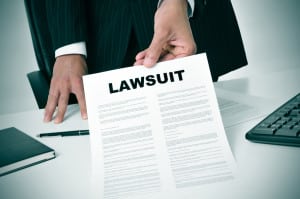 Businesses spent much of 2020 dealing with FCRA lawsuits – the Fair Credit Reporting Act . In fact, over the course of the past few years, FCRA lawsuits have been on the rise.
Businesses spent much of 2020 dealing with FCRA lawsuits – the Fair Credit Reporting Act . In fact, over the course of the past few years, FCRA lawsuits have been on the rise.
Why is this happening, and how can you protect your business?
If you do not have airtight policies regarding your hiring processes and provide the right disclosures at the right time, you could be a prime target for FCRA lawsuits. One of the most commonly-targeted areas is a lack of compliance with mandatory consent and disclosures in the FCRA regarding the hiring process. Because the FCRA requires minimum statutory damages of $100 to $1,000 for violations, it is very open to class action lawsuits.
Some of the areas of exposure that businesses encounter include not providing proper disclosure forms before obtaining consumer reports and failing to obtain authorization in a properly documented way. What does this look like in practice?
- 7-Eleven reached a $2 million settlement over a lawsuit that alleged they failed to provide standalone notice of background checks to 60,000 job applicants in the class.
- A case against check cashing stores found that, by including extraneous information relating to other state disclosure requirements in the FCRA disclosure, the regulation was violated and it led to FCRA lawsuits.
- Delta Air Lines paid a $2.3 million settlement for FCRA lawsuits that claimed they failed to provide standalone background check disclosures that only consisted of FCRA disclosure material.
- Costco paid a $2.5 million settlement regarding another class action lawsuit that alleged they failed to use correct standalone disclosure notices before getting background reports on their job applicants.
- A Wal-Mart lawsuit alleged that Wal-Mart disobeyed FCRA guidelines in failing to give adequate disclosure and failing to provide a summary of applicant and consumer rights. These FCRA lawsuits are also quite common.
- Frito-Lay settled a $2.4 million settlement that alleged they violated the disclosure requirements of the Fair Credit Reporting Act by conducting background investigations without providing a summary of rights.
- Pepsi was also subject to a lawsuit that involved a violation of the FCRA by not providing disclosure in a standalone document free from other disclosures and information.
Do you want to protect your business against FCRA lawsuits? We are here to help.
James P. Randisi, President of Randisi & Associates, Inc., has since 1999 been helping employers protect their clients, workforce and reputation through implementation of employment screening and drug testing programs. This post does not constitute legal advice. Randisi & Associates, Inc. is not a law firm. Always contact competent employment legal counsel. Mr. Randisi can be contacted by phone at 410.494.0232 or Email: info@randisiandassociates.com or the website at randisiandassociates.com


